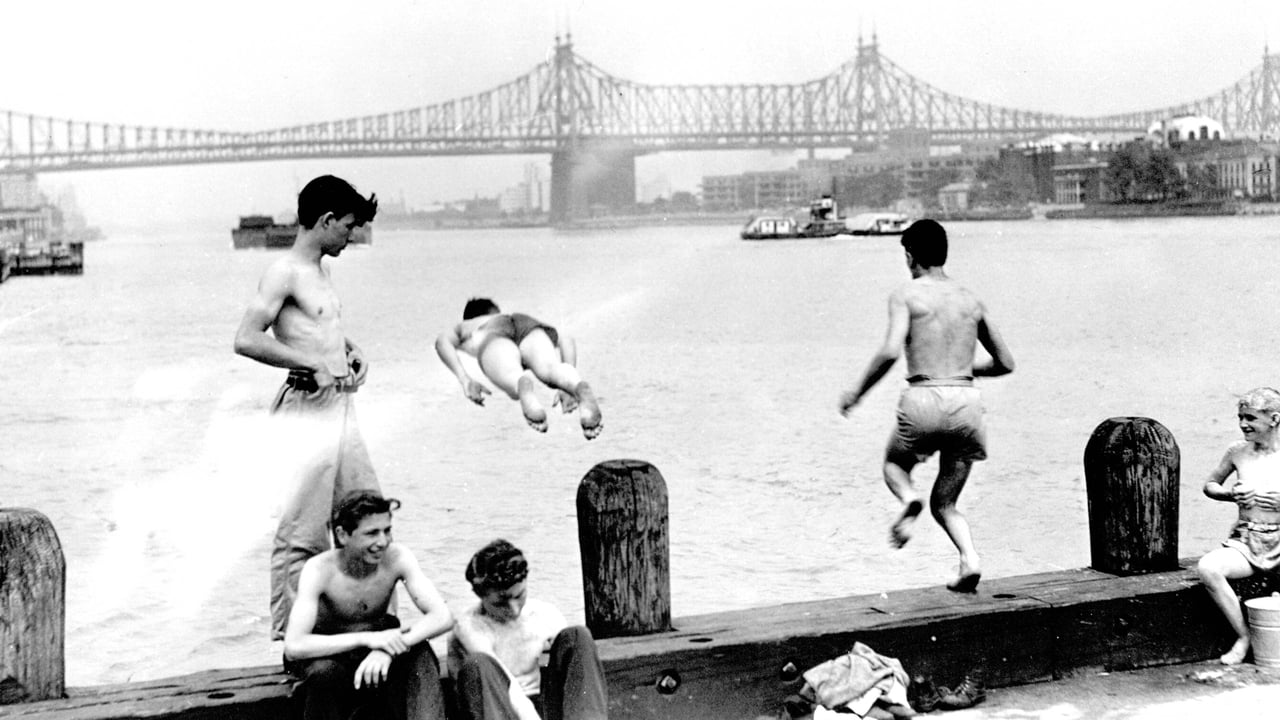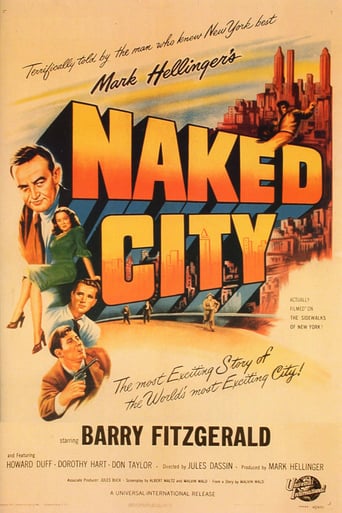



Better Late Then Never
It was OK. I don't see why everyone loves it so much. It wasn't very smart or deep or well-directed.
View MoreI think this is a new genre that they're all sort of working their way through it and haven't got all the kinks worked out yet but it's a genre that works for me.
View MoreJust intense enough to provide a much-needed diversion, just lightweight enough to make you forget about it soon after it’s over. It’s not exactly “good,” per se, but it does what it sets out to do in terms of putting us on edge, which makes it … successful?
View MoreDirector Jules Dassin delivers a strong detective film in 'The Naked City', a film often described as noir, but which is less hardboiled than others in the genre. The murders at the beginning of the film over deadpan narration are cold-blooded enough, and I loved how the film had such a sense of realism in the methodical police investigation which follows. There are excellent shots all over New York, in the air and on the ground, for which William H. Daniels would win an Oscar for cinematography. There aren't any big stars in the cast, and that adds to the film's appeal, though unfortunately the quality of the acting varies (for example, check out Dorothy Hart's reaction to finding out her friend is dead). Anchoring it all is Barry Fitzgerald, who turns in a strong performance as the veteran Irish-American detective, mentoring a younger cop (Don Taylor), dealing with various crackpots, and putting the squeeze on a habitual liar (Howard Duff), all with wry humor. Dassin was a couple of years away from being blacklisted in Hollywood, and seven from making the iconic Rififi in France, and one can see parallels in how tight and realistic the storytelling is between the two films. Intelligent and stands the test of time ... and oh, I loved that last line - "There are eight million stories in the city; this has been one of them."
View MoreThis film has so many positive aspects to it that I decided to ignore the point when the narration, as innovative and unique as it was for its time, reached beyond the limits of funkiness and corniness, which is very unlike the New York City of my memories. While I actually appreciated the narration at times, it eventually became too much of a good thing, especially some of the ridiculous and annoying comments interjected by many of "the average city folk on the street". Mark Hellinger, the producer, may have passed away too soon after his very personalized "love note" to New York was completed, but didn't director Jules Dassin ever bother to observe the finished product before it was finally released to the world?I like the realistic atmosphere of the hot summer days and nights in New York, and, for a time, the documentary style did succeed in authenticating a fictional story. Barry Fitzgerald, Howard Duff, and Don Taylor (remember him as Elizabeth Taylor's seriously upstaged groom in "Father of the Bride?") turned in very decent performances. I also enjoyed catching a brief glimpse of Arthur O'Connell as an inquisitive police detective several years before he hit the jackpot with his Oscar nominations in "Picnic" (1956) and in "Anatomy of a Murder" (1960), both outstanding, memorable accomplishments. If Mr. O'Connell continued to be neglected by Hollywood, as he was for nearly two decades, we would have been all the poorer for it. The two actors who left the biggest impressions on me here were not the leads but rather Ted de Corsia, who effortlessly played a very sinister Willy Garzah, and a mostly unknown Adelaide Klein as the mother of murder victim, Jean Dexter, in two very gripping and convincing scenes inside and then outside of the city morgue.Aside from the often goofy interjections of the pedestrians on the street, which were not only unnecessary but at times disruptive to the natural flow of events on the screen, I thought this was a decent movie, which allowed us a no-nonsense, if not disturbing, view of the Big Apple in the simmering summer of 1947 before the days of air conditioning, all in glorious black and white. This movie was playing in the theaters at the time I was conceived in the spring of 1948, so that may explain my close connection to it and to many other movies produced in 1948 and 1949. As a matter of fact, I very nearly entered this world in the popcorn littered aisle of a movie theater in Newark, New Jersey, and the rest is history.
View MoreI saw this movie for the first time on TCM recently. Barry Fitzgerald was an interesting choice for the lead. He showed up most often as a supporting player in his long career, but he played the key part of the experienced policemen well.Anyone who enjoys crime dramas will enjoy this movie. It gives you a real good snap shot of life all over New York City in that post war time period and meticulously documents street-level police investigative procedure. The lead in shot over the city must have inspired the almost identical shot used in West Side Story some years later.The story involves the murder of a single woman in an apartment. Suspicion initially settles on one of her male suitors who implicates himself by a string of lies he tells the police. Later on, the detectives discover a connection to a burglary ring which leads them to the actual killer.In the end, you get exactly what you expect from a 1940s cop movie. This film is not exactly film noir, but admittedly that's a subjective statement. It's real close in tone and subject matter, so you wouldn't be wrong in adding it to your film noir library. Enjoy this movie and spend some time in Hollywood's classic era!
View MoreAt the time of its release, "The Naked City" was a contemporary offering in the sense that it utilised the "docu-noir" and "Italian neorealist" styles which were popular during the late 1940s. More significantly, however, it was also incredibly innovative and influential because, not only was it the first movie to be shot entirely on-location in New York City but also it's widely acknowledged as being the first movie to show in detail, the very routine nature of a police investigation. This effectively paved the way for all the police procedural films that followed and so its significance in cinema history is difficult to overstate.The role that the city plays is enormous as its presence and characteristics are re-emphasised repeatedly throughout the film. The use of location shooting, views of the subways and non-professionals in some of the supporting roles, all add authenticity to the action and shots of children at play, street vendors and busy streets convey a strong sense of the vitality of the city and its relentless nature.When the dead body of a beautiful young woman is found in her apartment by her housekeeper, Detective Lieutenant Dan Muldoon (Barry Fitzgerald) and his young partner, Detective Jimmy Halloran (Don Taylor) are assigned to the case. After the medical examiner confirms that Jean Dexter (who was a model), had been murdered, Muldoon questions the housekeeper, Martha Swenson (Virginia Mullen) about her employer's friends and this leads to Frank Niles (Howard Duff), Dr Lawrence Stoneman (House Jameson) and Ruth Morrison (Dorothy Hart) all being interviewed by the detectives.Niles had been one of the victim's ex-boyfriends who had since become engaged to Ruth Morrison. He proves to be an inveterate liar and further checks establish that he'd sold a gold cigarette case that had been stolen from Dr Stoneman and that his fiancée's engagement ring had also been stolen. Dr Stoneman confirms that he had prescribed the sleeping tablets that had been found in the victim's apartment and Ruth Morrison, a model who'd worked with Dexter, is soon regarded as not being involved in any wrongdoing.Further investigations reveal that Jean Dexter and Frank Niles had been involved in arranging jewellery thefts and that they had hired other criminals to actually carry out the robberies. This information then leads to the killer's identity and motive finally being discovered.The police officers in this movie are depicted as being good humoured, scrupulously honest and not at all cynical. Muldoon is a very friendly and experienced detective who has spent most of his career dealing with homicide investigations and Barry Fitzgerald is amusing but also sometimes a little over-the-top in the way that he portrays this Irishman. Don Taylor is good in his role as Halloran who is Muldoon's very enthusiastic and well-meaning partner and Howard Duff provides some moments of humour in his excellent performance as the disreputable Niles who is unable to open his mouth without telling a series of lies. Ted de Corsia also makes a strong impression in his minor part as a harmonica-playing wrestler!Producer Mark Hellinger's narration is very dated but Jules Dassin's direction and the quality of William H Daniels' Oscar-winning cinematography are both very impressive. Another outstanding highlight of this film is the final chase sequence which is both exciting and brilliantly choreographed.
View More